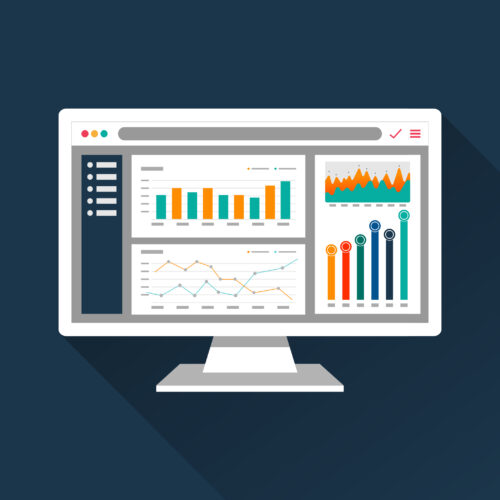Digital marketing is one of the most important aspects of any business.
It allows you to reach a large audience with your message and can help you achieve incredible results.
However, to measure the success of your digital marketing campaigns, you need to track the right digital metrics.
As a data-driven marketing agency, we understand the importance of this data.
Today, we want to discuss the top metrics you should measure to optimize your digital marketing efforts.
Here are the top metrics you need to measure in digital marketing.
Web Traffic
Web traffic is one of the most critical digital metrics to measure.
I people aren’t coming to your website, then all the other metrics won’t matter. Therefore, you need to track the number of visitors to your website and look at their behaviour.
There are several questions you should ask yourself when measuring your web traffic, including:
- Is traffic growing or declining?
- Where are my visitors coming from? Social media, organic search, paid ads etc.?
- What pages do they spend the most time on and why?
- What devices are they using to visit my website?
- How does my web traffic compare to that of my competitors?
Answering these questions will help you understand your web traffic and make changes to improve it if necessary.
Statista released data showing that over 54.8% of all web traffic comes from mobile phones. If this is true for your website, then it makes sense to optimize it for mobile devices. By doing so, you can improve your web traffic.
You can measure web traffic using various tools. At Digitlab, we can assist you with a custom digital performance reporting tool to help you track your web traffic more accurately.
Traffic Source
Once you measure your traffic, the traffic source is the next essential digital metric you should track.
A traffic source refers to where your web visitors are coming from. There are several common sources that you should be aware of:
- Direct Traffic: Direct traffic comes to your website directly, without going through other websites. Most often, this is because someone typed in your website address or bookmarked it into their browser.
- Organic search: Organic search traffic comes from people who found your website through a search engine, such as Google, Yahoo, or Bing.
- Paid search: Paid search traffic comes from people who clicked on an ad you paid for, such as Google AdWords.
- Social media: Social media traffic comes from people who found your website through a social media site, such as Facebook, Twitter, or LinkedIn.
- Email marketing: This traffic comes from people who clicked on a link in an email you sent them.
- Referral traffic: Referral traffic comes from people who clicked on a link on another website and landed on your website.
By measuring your traffic source, you can determine which channels are working best for you and make changes to those that are not.
This will help you allocate your marketing budget more effectively and achieve better results.
Time-On-Page
Our list of the top digital metrics cannot be complete without mentioning the time-on-page factor. This metric tells you how much time people are spending on your website.
The longer they stay, the more likely they will convert into customers.
There are several things you can do to increase the amount of time people spend on your website, including:
- Optimizing your pages for mobile devices.
- Creating engaging and relevant content.
- Offering free resources, such as white papers or eBooks.
- Creating a user-friendly website design.
Time-on-page is one of the most critical digital metrics to measure, especially if running an eCommerce website.
By tracking time-on-page, you can determine which pages are most engaging and make changes to those that aren’t.

Bounce Rate
Another crucial digital metric is the bounce rate. The bounce rate refers to people who visit a page on your website then leave without taking any action.
For instance, a visitor who leaves your website without subscribing to an email list, clicking another page, or placing an order is a bounce.
Measuring bounce rate is crucial because it tells you whether your content and web design are engaging enough to keep people interested.
If bounce rates are high, here are some things you can do to improve them:
- Improve your website design.
- Create more engaging content.
- Place calls to action throughout your website.
- Make sure your pages are loading quickly.
You can determine which pages on your website need the most improvement by tracking bounce rates and making the necessary changes.
Conversion Rate
The conversion rate is one of the most critical digital metrics that you can track.
It refers to the percentage of people who visit your website and take a desired action, such as subscribing to an email list or placing an order.
The higher the conversion rate, the more effective your website is at converting traffic into paying customers.
If you notice that your conversion rate is low, there are several things you can do to improve it:
- Create compelling offers: When people visit your website, make sure you have an exciting offer to entice them to take action.
- Make it easy to buy: Make sure your checkout process is quick and easy.
- Provide quality customer service: When people have questions or problems, they want to get help quickly and easily. Make sure your customer service is top-notch.
- Test different designs: Try different designs for your website and see which ones convert the best.
You will better understand your website’s performance by tracking your conversion rate. This will help you make the required changes to increase leads, conversions, and sales.
Understand Your Digital Metrics
There are many digital metrics that you can track to measure the performance of your digital marketing campaign.
However, the ones outlined in this article are some of the most important.
A custom digital performance reporting tool can make measuring these top metrics easier for your marketing team.
When you track these metrics, you’ll better understand what your customers want and how to improve your online marketing campaigns.
This will help you get better results from your marketing efforts and ultimately increase sales and profits.





